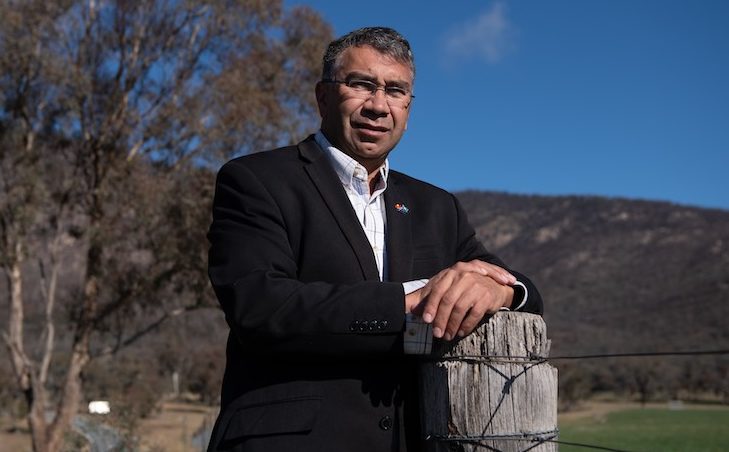
A GAME-changing amendment to the Native Title Act 1993 will force the ACT government to negotiate land rights with local traditional custodians, including the Ngambri people, says Ngambri elder Paul House.
The amendment comes 20 years after the then Gary Humphries-led ACT Liberal government, in the spirit of reconciliation, established a “99 Year Namadgi Special Aboriginal Lease”, which was signed by two of three Ngambri/Ngunnawal signatories.
As reported by “CityNews” in August, the signatories gave up a native title claim lodged in the Federal Court and, in return, they would work in partnership with the government to manage Namadgi National Park.
However, under the ACT Labor-led government, the agreement never came to fruition and the interim board, which was to become a statutory board of management, was quietly dissolved in about 2007.
Now, the government can’t avoid native title any longer, says Paul House.
Under the new section in the Native Title Legislation Amendment Act 2021, passed in early February, the extinguishment of native title rights in relation to the preservation of the natural environment, is to be disregarded.
“It’s an amendment that allows Aboriginal and Torres Strait Islander people all over the country to claim reserve at national parks,” he says.
“It justifies reopening the negotiations over the ownership and management of Namadgi National Park, if not also over other areas set aside as conservation reserves such as parts of the national capital open space system and river corridors within the ACT.”
Mr House is now calling on the government to withdraw the restrictive clauses in the “99 Year Namadgi Special Aboriginal Lease” that required the signatories to give up native title.
“That agreement was signed in 2001 when the native-title system was only six years old. We knew very little about how the native-title system worked at that time,” he says.
“We are now 20 years further down the track, there are over 520 native title determinations across the country, and over 1300 registered indigenous land-use agreements across the country. It’s time to let the native-title system work in the ACT.”
Mr House says the ACT government has stifled the whole process since the start of the Namadgi agreement and, as the years have gone by, they’ve never acknowledged that.
“They always thought that our native title rights have been extinguished in the ACT, they haven’t,” he says.
“So we’re asking them to withdraw the clauses so we can lodge a fresh native title claim, but even if they don’t drop the clauses, we can still make a claim.”
Mr House also wants to see the government support the Native Title Services Corp (NTSCorp), a company that assists traditional owners to exercise rights under the act, with sufficient resources and funding needed for them to prepare their native-title claim.
“We ask the ACT government to fund NTSCorp to undertake the research to determine the families’ connection to country here – all the different competing families,” he says.
“It’s their responsibility. As part of this inclusive approach they talk about.”
On top of this funding, Mr House believes there are other steps the government has to take to progress towards working closely with local Aboriginal people in the ACT.
“They need to acknowledge that the land was taken from our ancestors without free, prior and informed consent,” he says.
“It was taken without a treaty and we’ve never been compensated for our losses.”
As part of those steps, Paul wants to see a treaty formed and he wants to see the government sit down and have open and honest dialogue with contemporary Aboriginal families who claim the ACT as their ancestral land.
“It’s a matter of a public record for the Ngambri people, and it’s also about voice, treaty, truth,” he says.
“There is a massive void in the truth about the ACT’s past that needs to be addressed.”
Mr House questions how the ACT government can talk about voice, treaty, truth, when it only gives voice to one tribe in Canberra.
“The one-tribe policy has to stop, it’s offensive and exclusive,” he says.
“Their one-tribe policy focuses on Ngunnawal and they don’t consult with anyone else, ignoring the historical truths of Ngambri providence here in the ACT.
“A one-tribe policy puts Aboriginal people into difficult situations where they may not be the right person to speak for a particular area.
“There are strict rules on custom around speaking on or for someone else’s country and the ACT government totally ignores that.
“Aboriginal families in the ACT, they need an opportunity to all be treated equally. At the moment that’s not happening.
“Ultimately we’re calling on the ACT government to move forward toward supporting Aboriginal people in the ACT with land rights and native title.”
Who can be trusted?
In a world of spin and confusion, there’s never been a more important time to support independent journalism in Canberra.
If you trust our work online and want to enforce the power of independent voices, I invite you to make a small contribution.
Every dollar of support is invested back into our journalism to help keep citynews.com.au strong and free.
Thank you,
Ian Meikle, editor









Leave a Reply